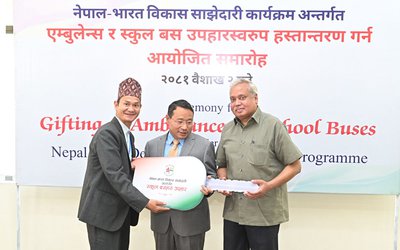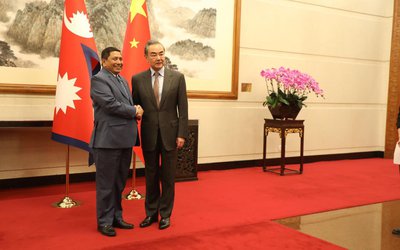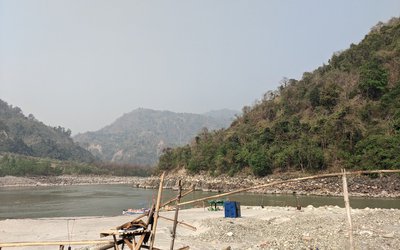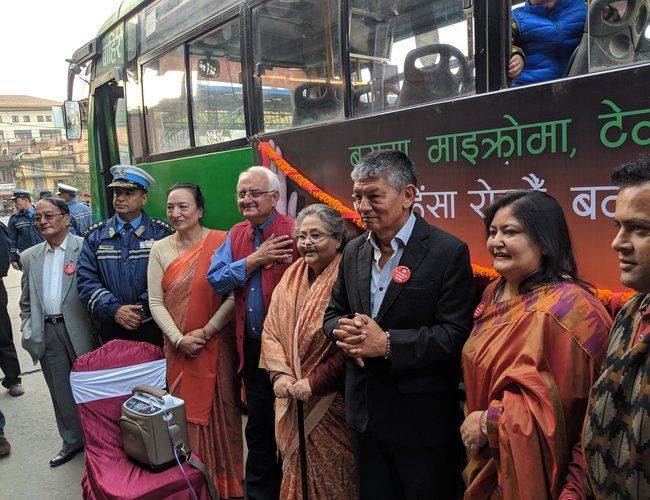
It doesn't take too long to notice female tempo drivers whizzing around the busy streets of Kathmandu, picking and dropping off passengers whilst avoiding the all too many potholes that litter the roads. This was, however, not always a common sight. In fact, it was only about three decades ago that the first woman, Laxmi Sharma, took a brave and, at that time, controversial step in becoming a tempo driver. Since then, Sharma has paved the way for other women to seek financial independence and job security through the tempo driving profession. It empowers women and it is this precise reason why Mina Chanda Topuri established a non-profit, public welfare organisation, the Nepal Transport Women Driver Group (NTWDG) in 2012. With around four-hundred members, Topuri's group help women realise their driving potential. She states: "Those who join our organisation as members, we are able to provide around ten percent of them with free driving lessons. Even men are welcome and if they need to seek support from us, we do our best to help them. Because of this, our organisation is supported by both men and women.”
NTWDG not only offers free driving lessons to a percentage of its members, but it also participates in active campaigning for the rights of female public transport drivers. Topuri explains, “We hold discussions on social issues and other issues too. We support female tempo drivers by offering them legal help if they get into accidents […] We do all we can to try and convince people that men and women are all equal. Now that there are laws in place, we can help female transport drivers file complaints against discrimination.”
Thanks to women like Topuri, who are handing down their expertise and support to their female counterparts, more and more women are daring to challenge gender stereotypes and enter the traditionally masculine world of tempo driving. Topuri estimates that there are around one thousand five-hundred female tempo drivers and it is likely that the numbers will continue to rise as society grows to become more accustomed to women drivers.
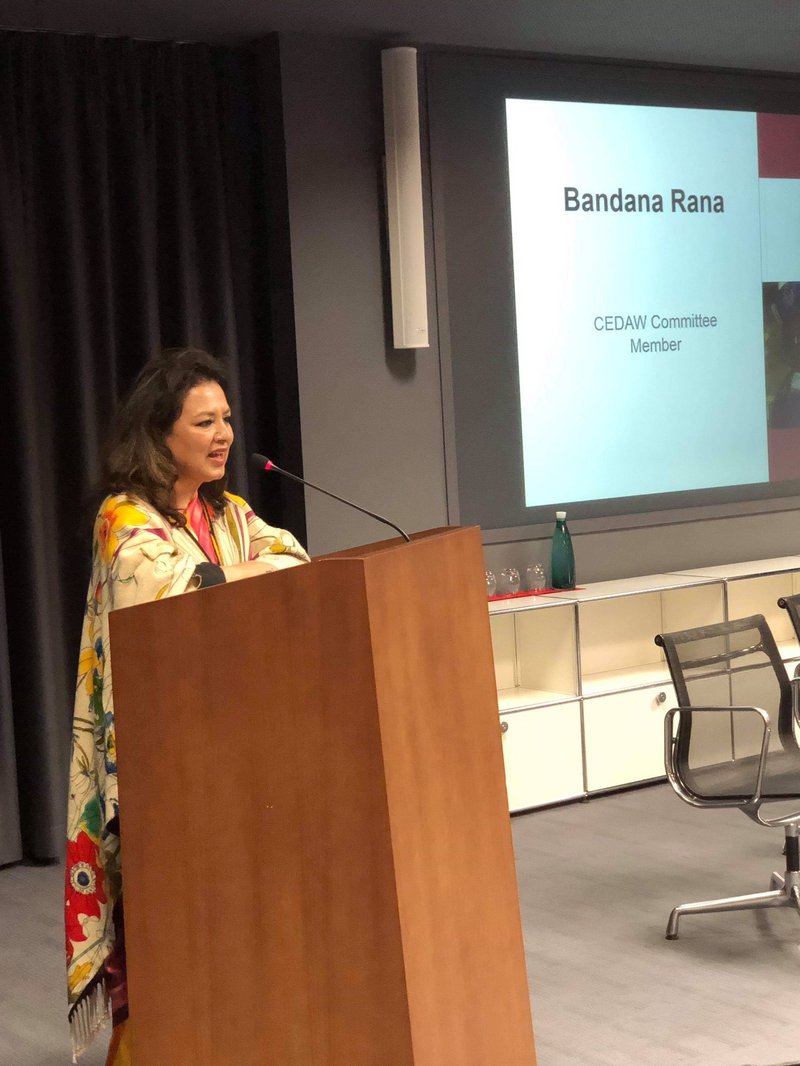
That being said, whilst Nepal is overcoming its gender discrimination against female public transport drivers, it is undeniable that more needs to be done in regards to sexual harassment on public transport. According to the World Bank survey (2013), one in four women have experienced ‘inappropriate touching’ whilst using public transport in Nepal, and more recent studies have found this figure to be even higher when looking into the issue at a provincial level. What is more, the Nepal Demographic and Health survey (2016) found that sixty-six percent of women who have experienced any type of physical or sexual violence do not seek help or talk to anyone about resisting the violence they face. With these facts in mind, it is, therefore, vital that international movements like UNiTE’s 16 Days of Activism against Gender-Based Violence Campaign makes a lasting impression to promote awareness and change that is much needed in Nepal.
16 Days of Activism Against Gender-Based Violence Campaign
The annual campaign commences on 25 November, the International Day for the Elimination of Violence against Women, to 10 December, Human Rights Day. This year Nepal took part in the 16 Days of Activism one day early; Zonta Club of Kathmandu, Sajha Yatayat, Metropolitan Traffic Police and Sabah Nepal jointly launched a campaign on sexual harassment against women on public transport. Additionally, to mark the official start date of the 16 Days of Activism, the President of Nepal, Bidhya Devi Bhandari, delivered a message regarding the campaign saying, “It is important to create awareness about violence against women and create opportunities to make women independent.”
This year’s theme is ‘Orange the World: #HearMeToo’ and it is the reason why all seven Provincial Assembly Buildings of Nepal were lit up in orange to celebrate the start of the campaign. Bandana Rana, a prominent Women’s Rights Activist who has been advocating for gender equality for three decades, explains that the 16 Days of Activism is an ongoing activity with collaborative action and outreach programmes to help raise awareness and build solidarity about the issue of violence against women. She speaks about the theme, “#HearMeToo was very contextual in the context of Nepal because there has been real silence where sexual violence against women is concerned […] women hesitate to speak about it because of the stigma attached to the women who are victims of sexual violence and the culture of silence.”
“I think this year, the theme being #HearMeToo is an opportunity to empower women and girls to speak out against sexual violence or any other forms of violence. And not speak out alone, but strengthen women who want to speak out, empower women, enable them to speak out, build their capacity, build their physical and mental strength so they are able to speak out. […] But of course, in addition to that, just speaking out is not enough, you need to have support systems. […] you have to build an environment to speak out but at the same time, we also have to advocate for stronger legal mechanisms, stronger support systems from the state or for building a conducive environment for women to be confident to speak out about violence.”
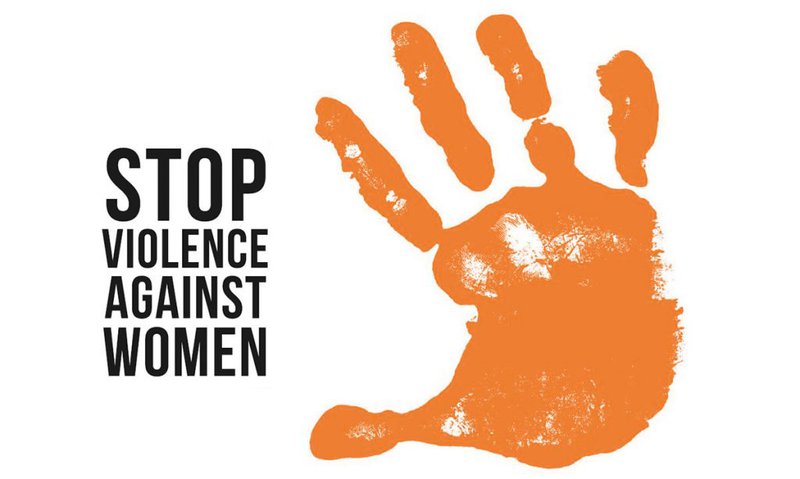
Rana, like Topuri, also recognises the importance of protecting the rights of female tempo drivers and adds, “The state needs to ensure their security, ensure that they should not be stigmatised, that they will not face any forms of violence from the passengers themselves. There has to be strict, stringent mechanisms to ensure that. But, of course, they do inspire other women to be more active, more smart, more vocal and know their rights, that is a right to choose your occupation.”
The emphasis on creating better legal systems shows that despite the Constitution of Nepal 2015 introducing the Sexual Harassment Prevention Act, clearly more needs to be done to prevent physical and sexual violence against women. This is seconded by the preliminary observations from the United Nations Special Rapporteur on violence against women, Dubravka Šimonović, who said about Nepal’s laws: “[…] considerable implementation gaps exist in almost all social policies related to women’s rights, ranging from various harmful practices, sexual violence, domestic violence to trafficking, and continue to pose a considerable challenge.”
Interviews with the Female Tempo Drivers
But what of the female tempo drivers themselves? If we are to gain a better understanding of the current situation faced by working women at the forefront of public transport, and the site of recurring sexual harassment, we must learn from their experiences. The following interviews will inform you of the reality of working as a female tempo driver.
Narmaya, 34, has been driving tempos for the last five years. Since she could not find any other jobs, she found that the tempo driving profession was easily available. However, she reveals: “Sometimes I feel that it is difficult to be a female tempo driver, some people mock us and say ‘Oh look it’s a girl driving’, but there are others who praise us women for doing this kind of work.” When asked about sexual harassment she becomes hesitant, “I have seen sexual harassment in some way or another but not when I have been driving. Bad things like sexual harassment should not be happening but it does […] I have so many things I wish to speak about but I cannot say. It is very difficult to explain, there are a lot of issues with it.” She did not know about the 16 Days of Activism.
Ramila, 24, started driving tempos four years ago. Having had a long-held interest in cars and driving, she decided to pursue her passion and turn it into a means of making money. Despite finding it a more difficult job than others, Ramila continues to drive. In regard to sexual harassment, she acknowledges, “We can generally see small problems here and there so you have to be able to control it. Men will try and sit next to you and flirt but you have to be strong enough to fight that kind of behaviour. I have not faced anything more than that though.”
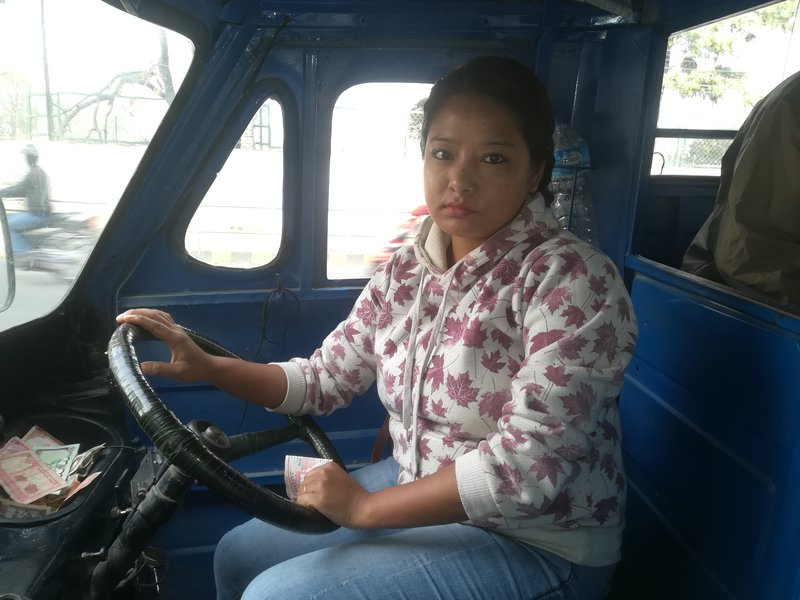
Ramila further goes on to describe: “In a country like Nepal, sexual harassment has always been going on, even nowadays you see stories of sexual violence against small children and young girls. Sexual harassment can be caused through the fault of the family, it can occur when families don’t properly care for their children or each other. We all have to do as much as we can to eliminate violence against women, we cannot do it alone or with a few people like me. Sometimes sexual harassment happens because of mental weakness, we cannot change the minds of people overnight but we must overcome this issue […] Sexual harassment can happen to anyone.” She also had not heard about the 16 Days campaign.
Sabita, 42, was the most seasoned tempo driver interviewed, having driven for twelve years. She explains how her family’s bad economic situation stemmed from relying only on her husband’s inadequate salary which forced her to seek work as a tempo driver. When Sabita first started driving, it was very difficult for her to be taken seriously as people found it very strange for a woman to be driving a tempo and they would laugh and mock her. Her voice gets impassioned as she continues to describe her experiences as a female tempo driver: "After years of driving, slowly and gradually passengers started riding in my tempo, now everyone rides my tempo, government officials and common people alike. Everyone gives me praise saying that I have done a good job. It is good to be a female tempo driver, it shows that women are making progress […] I feel a sense of pride. I’m not reluctant about my job, I am happy to be a tempo driver. I feel pride to be a tempo driver, making money and being independent. In a country like ours, where everyone prefers boys and see girls as a curse, this is a patriarchal society. […] We all struggle, there is no work that is big or small. […] We are exchanging money with our sweat.”
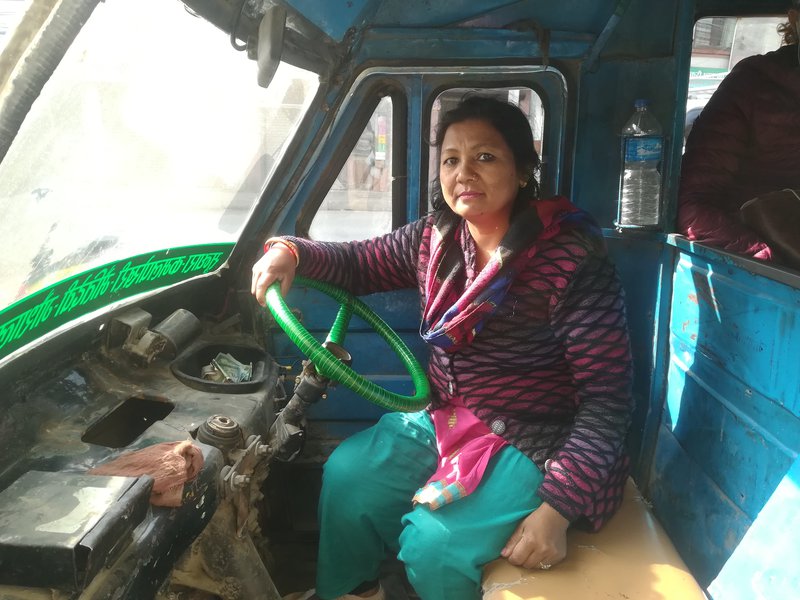
On the issues of sexual harassment, Sabita declares, “Everybody seeks to benefit from the weakness of women. I don’t want to be weak, I left my alcoholic husband to live on my own with my daughters, I’m standing on my own two feet. Women can become victims of sexual harassment from anyone. Women need to have pride in themselves because they need to be able to stand up for themselves. […] . If there was any kind of sexual harassment on my tempo, I would retaliate against it. We can give suggestions on how to make change but we mustn’t be passive.” When asked about the 16 Days of Activism, Sabita reveals that she is a committee member of the Independent Transport Workers Association of Nepal and that even in their most recent meeting they were not told about this campaign.
Bina, 19, was the youngest and most recent tempo driver, having only started the work a year and a half ago. She learnt about the profession through her brother-in-law’s sister who drove a tempo for a living and also taught her to drive. Bina breezily confesses, “I haven’t faced any difficulties for now, it’s alright. It was my wish to be a driver, it’s my profession of choice.” She didn’t have much to say about sexual harassment apart from hearing stories about it. However, she was the only female tempo driver who was somewhat aware of the 16 Days of Activism, “I heard some people talk about it but I don’t know enough to say anything on it.”
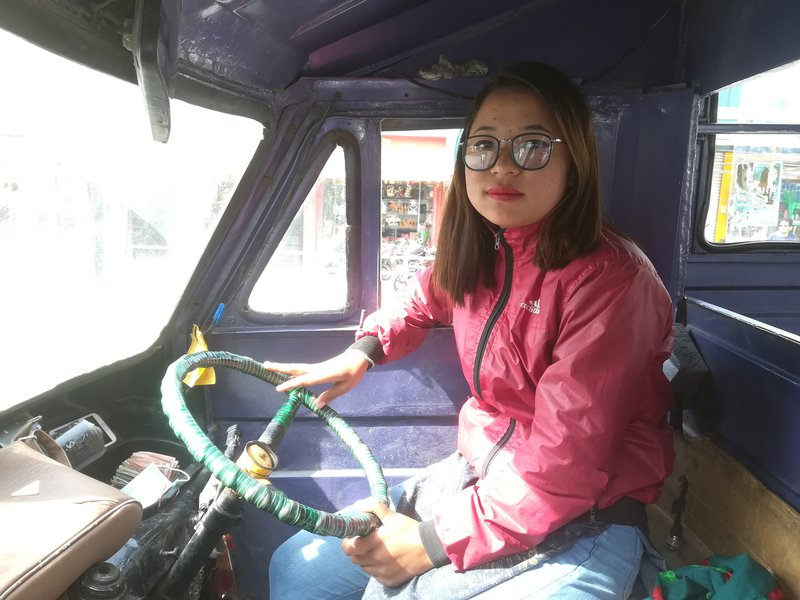
It is all very well and good having a dedicated period of campaign time to a certain cause as the 16 Days of Activism against Gender-Based Violence does, but in reality, what the interviews expose is that not enough campaigning is being done to raise awareness at all levels. It is astounding that despite Nepal opening the 16 Days of Activism with the issue of sexual harassment on public transport, the majority of the interviewed female tempo drivers had not heard of this campaign. It should not only be the educated or profit-making organisations that are made aware of such prominent campaigns, instead there must be more effort made to reach the very people who face the actual issues the campaign is about. As the 16 Days of Activism nears its end, it is evident that much more needs to be done for next year’s campaigning in order to have a comprehensive outreach that is accessible to all members of the public.

Saima Pun
Pun is an intern from the UK
- NEPAL TOURISM CAMPAIGN #VisitNepal2020
- Mar 05, 2019
- Kathmandu’s Silent Killer
- Feb 10, 2019
- “The British Council Vave Got A Lot To Offer"
- Jan 26, 2019
- “You Get Violence Everywhere…The Problem Here, I Think, Is That There’s No Safety Net”
- Jan 26, 2019
- “What The UN Sees As A Challenge For Nepal … Is Inclusion”
- Jan 14, 2019





